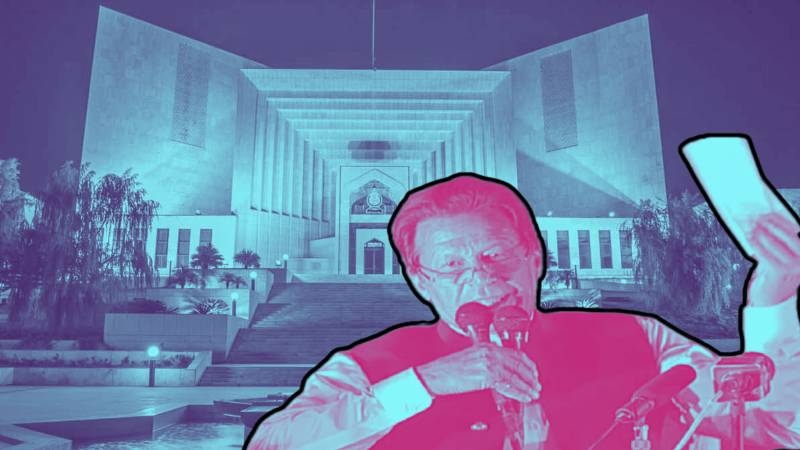
The federal government on Friday approached the Supreme Court to challenge a decision by the Islamabad High Court (IHC) regarding the open trial of former prime minister Imran Khan and others in the cipher case.
The federal government has argued that the doctrine of open trial in a matter involving state secrets, such as a diplomatic cipher, is injurious to the entire scheme of law.
On specific points, the government has argued in its petition that neither did the IHC discuss Section 14 of the Official Secret Act (OSA) properly while passing a ruling on the matter, nor was its order sustainable as an intra-court appeal (ICA) was not competent and assumption of jurisdiction by the divisional bench of the IHC in the matter was erroneous.
On November 21, 2023, while issuing a ruling on an ICA moved by Imran Khan seeking a trial in open court, the court had declared notifications from the Law Ministry to hold the trial in jail to be without any lawful authority and of no legal effect. The court had ruled that the proceedings in the cipher case, with effect from August 29, 2023, in jail premises in a manner that cannot be termed as an open trial and stand vitiated.
The federal government had listed Imran Khan, the Federal Investigation Agency (FIA) director general, the Islamabad chief commissioner, the Islamabad Police inspector general, the district magistrate, the judge of the special court formed under OSA 1923, superintendents of Adiala and Attock jails as respondents.
The government's appeal contended that the order from IHC's divisional bench was not in consonance with the law laid down on the subject.
It added that the ICA was not competent and, hence, unmaintainable in the eyes of the law. The appeal further contended that the ICA and the order issued in consequence were not covered within the meaning of section 3 of the Law Reforms Ordinance, 1972, further contending that the IHC, in its order, has gone beyond the prayer made by Imran Khan in his writ petition.
"That the notifications dated September 12, 2023, September 25, 2023, October 3, 2023, and October 13, 2023, were not in question in the original writ petition," the government contended.
"It is a settled law that government is not competent to issue notifications with retrospective affect unless and until it is not injurious to vested right of the individual."
The government referred to Section 14 of the Official Secret Act, noting that it differed from other laws and talked about the secrecy of proceedings.
"Official Secret Act does not revolve around ouster of some secrets and if unauthorised ouster of secret can be made public by way of judicial proceedings conducted in public may prejudice the national security and might adversely affect the state sovereignty."
The federal government claimed that the divisional bench of the IHC failed to discuss Section 14 of OSA properly.
"Principle of open trial has not been rightly applied in the cases of Official Secret Act, and the intention of the legislature in introducing Section 14 of OSA was to protect state-level secrets."
The federal government requested the apex court to set aside IHC's decision from November 21, 2023, in the interest of justice.

